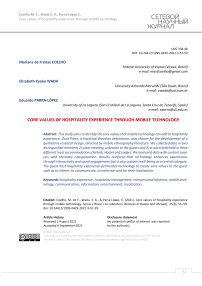Core values of hospitality experience through mobile technology
Автор: Coelho Mariana De Freitas, Wada Elizabeth Kyoko, Parra-Lpez Eduardo
Журнал: Сервис в России и за рубежом @service-rusjournal
Рубрика: Актуальные вопросы международного сотрудничества в сфере услуг
Статья в выпуске: 3 (95), 2021 года.
Бесплатный доступ
This study aims to identify the core values that mobile technology can add to hospitality experience. Ouro Preto, a historical Brazilian destination, was chosen for the development of a qualitative research design, directed by mobile ethnography literature. We collected data in two distinguished moments 1) a bar meeting, unknown to the guests and 2) a solo trip behold in three different local accommodations (Airbnb, Hostel and Lodge). We analyzed data with content analysis with thematic categorization. Results reinforce that technology enhances experiences through interactivity and social engagement, but it also sustains well-being as a central category. The guest-host hospitality experience permeates technology to create core values to the guest such as to inform, to communicate, to entertain and for their localization.
Hospitality experience, hospitality management, interpersonal relations, mobile technology, communication, information, entertainment, localization
Короткий адрес: https://sciup.org/140259963
IDR: 140259963 | DOI: 10.24412/1995-042X-2021-3-51-59
Список литературы Core values of hospitality experience through mobile technology
- Bardin, L. (2008). Análise de conteúdo. 4th ed. Lisboa: Ediçao 70.
- Bosio, B., & Prunthaller, S. (2018). Mobile Ethnography as an Innovative Tool for Customer Experience. ARA: Journal of Tourism Research / Revista de Investigación Turística, 8(2).
- Brotherton, B. (1999). Towards a definitive view of the nature of hospitality and hospitality management. International Journal of Contemporary Hospitality Management, 11(4), 165-173.
- Buhalis, D., & Foerste, M. (2015). SoCoMo marketing for travel and tourism: Empowering co-creation of value. Journal of Destination Marketing & Management, 4(3), 151-161. doi: 10.1016/j.jdmm.2015.04.001.
- Buhalis, D., & Law, R. (2008). Progress in information technology and tourism management: 20 years on and 10 years after the Internet-The state of eTourism research. Tourism Management, 29(4), 609-623.
- Buhalis, D., & Main, H. (1998). Information technology in peripheral small and medium hospitality enterprises. International Journal of Contemporary Hospitaltiy Management, 5(10), 198-202.
- Carlson, J., Rosenberger III, P. J., & Rahman, M. M. (2015). A Hierarchical Model of Perceived Value of Group-Oriented Travel Experiences to Major Events and its Influences on Satisfaction and Future Group-Travel Intentions. Journal of Travel & Tourism Marketing, 33(9), 1251-1267. doi: 10.1080/10548408.2015.1117407.
- Coelho, M. de F. (2017). Viagens De Brasileiros: Um Modelo De Relagoes Entre Experiencia Turística Memorável, Mindfulness, Transformagoes Pessoais E Bem-Estar Subjetivo. Minas Gerais: Universidade Federal de Minas Gerais.
- Conway, D. (2013). Slow tourism: experiences and mobilities. Annals of Tourism Research, 40, 444-446. doi: 10.1016/j.annals.2012.11.002.
- Hemmington, N. (2007). From service to experience: Understanding and defining the hospitality business. Service Industries Journal, 27(6), 747-755.
- Kansakar, P., Munir, A., & Shabani, N. (2018). Technology in Hospitality Industry: Prospects and Challenges. arXiv.org e-Print Archive, 1-6.
- Knobloch, U., Robertson, K., & Aitken, R. (2017). Experience, Emotion, and Eudaimonia: A Consideration of Tourist Experiences and Well-being. Journal of Travel Research, 56(5), 651-662. doi: 10.1177/0047287516650937.
- Kwon, J. M., Bae, J., & Blum, S. C. (2013). Mobile applications in the hospitality industry. Journal of Hospitality and Tourism Technology, 4(1), 81-92.
- Lashley, C. (2008). Studying hospitality: Insights from social sciences. Scandinavian Journal of Hospitality and Tourism, 8(1), 69-84.
- Law, R., Buhalis, D., & Cobanoglu, C. (2014). Progress on information and communication technologies in hospitality and tourism. International Journal of Contemporary Hospitality Management, 26(5), 727-750.
- Lugosi, P. (2008). Hospitality spaces, hospitable moments: consumer encounters and affective experiences in commercial settings. Journal of Foodservice, 19(2), 139-149. doi: 10.1111/j.1745-4506.2008.00092.x.
- Marietto, M. L. (2018). Observado participante e nao Participante: contextualizagao teórica e sugestao de roteiro para aplicagao dos métodos. Iberamerican Journal of Strategic Management, 17(4), 5-18.
- Matteucci, X., & Filep, S. (2015). Eudaimonic tourist experiences: the case of flamenco. Leisure Studies, 4367, 1-14. doi: 10.1080/02614367.2015.1085590.
- Muller, C. (2010). Hospitality technology: a review and reflection. Worldwide Hospitality and Tourism Themes, 2(1), 9-19. doi: 10.1108/17554211011012568.
- Muskat, B., Muskat, M., & Zehrer, A. (2018). Qualitative interpretive mobile ethnography Qualitative interpretive mobile ethnography. Anatolia, 29(1), 98-107. doi: 10.1080/ 13032917.2017.1396482.
- Neuhofer, B., Buhalis, D., & Ladkin, A. (2014). A Typology of Technology-Enhanced Tourism Experiences. International Journal of Tourism Research, 16(4), 340-350. doi: 10.1002/jtr.1958.
- Neuhofer, B., Buhalis, D., & Ladkin, A. (2015). Smart technologies for personalized experiences: a case study in the hospitality domain. Electronic Markets, 25, 243-254. doi: 10.1007/s12525-015-0182-1.
- Olsen, M., & Connolly, D. (2000). Experience-based Travel: How Technology is Changing the Hospitality Industry. The Cornell Hotel and Restaurant Administration Quarterly, 41(1), 30-40. doi: 10.1016/S0010-8804(00)88883-7.
- Pine, B. J., & Gilmore, J. H. (1998). Welcome to the Experience Economy. Harvard Business Review, (July-August), 97-105.
- Poulston, J. (2015). Expressive labour and the gift of hospitality. Hospitality & Society, 5(2), 145165. doi: 10.0.5.106/hosp.5.2-3.145_1.
- Telfer, E. (2000). The philosophy of hospitableness. In: C. Lashley, & A. Morrison (Eds.). In Search of Hospitality; Theoretical Perspectives and Debates. Oxford: Butterworth-Heinemann.
- Teng, C. C. (2011). Commercial hospitality in restaurants and tourist accommodation: Perspectives from international consumer experience in Scotland. International Journal of Hospitality Management, 30(4), 866-874. doi: 10.1016/j.ijhm.2011.01.007.
- Tung, V. W. S., & Ritchie, J. R. B. (2011). Exploring the essence of memorable tourism experiences. Annals of Tourism Research, 38(4), 1367-1386.
- Verma, R., Stock, D., & McCarthy, L. (2012). Customer Preferences for Online, Social Media, and Mobile Innovations in the Hospitality Industry. Cornell Hospitality Quarterly, 53(3), 183-186.
- Viglia, G., Minazzi, R., & Buhalis, D. (2016). The influence of e-word-of-mouth on hotel occupancy rate. International Journal of Contemporary Hospitality Management, 28(9), 2035-2051. doi: 10.1108/ijchm-05-2015-0238.
- Zhang, T., Seo, S., & Ahn, J. A. (2018). Why hotel guests go mobile? Examining motives of business and leisure travelers. Journal of Hospitality Marketing & Management, 28(5), 621-644. doi: 10.1080/19368623.2019.1539936.


